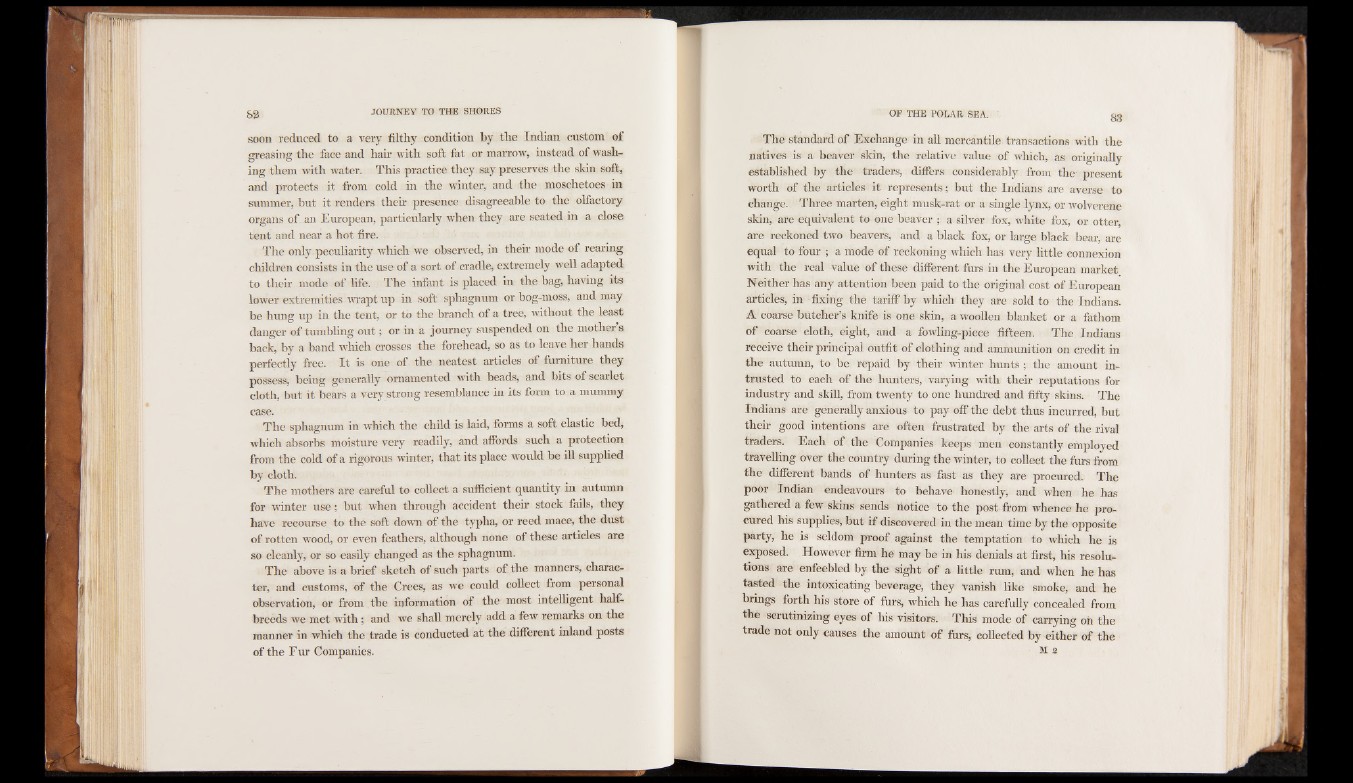
soon reduced to a very filthy condition by the Indian custom of
greasing the face and hair with soft fat or marrow, instead of washing
them with water. This practice they say preserves the skin soft,
and protects it from cold in the winter, and the moschetoes in
summer, but it renders their presence disagreeable to the olfactory
organs of an European, particularly when they are seated in a close
tent and near a hot fire.
The only peculiarity which we observed, in their mode of rearing
children consists in the use of a sort of cradle, extremely well adapted
to their mode of life. The infant is placed in the bag, having its
lower extremities wrapt up in soft sphagnum or bog-moss, and may
be hung up in the tent, or to the branch of a tree, without the least
danger of tumbling out ; or in a journey suspended on the mother’s
back, by a band which crosses the forehead, so as to leave her hands
perfectly free. It is one of the neatest articles of furniture they
possess, being generally ornamented with beads, and bits of scarlet
cloth, but it bears a very strong resemblance in its form to a mummy
case.
The sphagnum in which the child is laid, forms a soft elastic bed,
which absorbs moisture very readily, and affords such a protection
from the cold of a rigorous winter, that its place would be ill supplied
by cloth.
The mothers are careful to collect a sufficient quantity in autumn
for winter use ; but when through accident their stock fails, they
have recourse to the soft down of the typha, or reed mace, the dust
of rotten wood, or even feathers, although none of these articles are
so cleanly, or so easily changed as the sphagnum.
The above is a brief sketch of such parts of the manners, character,
and customs, of the Créés, as we could collect from personal
observation, or from the information of the most intelligent half-
breeds we met with ; and we shall merely add a few remarks on the
manner in which the trade is conducted at the different inland posts
of the Fur Companies.
The standard of Exchange in all mercantile transactions with the
natives is a beaver skin, the relative value of which, as originally
established by the traders, differs considerably from the present
worth of the articles it represents; but the Indians are averse to
change. Three marten, eight musk-rat or a single lynx, or wolverene
skin, are equivalent to one beaver ; a silver fox, white fox, or otter,
are reckoned two beavers, and a black fox, or large black bear, are
equal to four ; a mode of reckoning which has very little connexion
with the real value of these different furs in the European market
Neither has any attention been paid to the original cost of European
articles, in fixing the tariff by which they are sold to the Indians.
A coarse butcher’s knife is one skin, a woollen blanket or a fathom
of coarse cloth, eight, and a fowling-piece fifteen. The Indians
receive their principal outfit of clothing and ammunition on credit in
the autumn, to be repaid by their winter hunts ; the amount intrusted
to each of the hunters, varying with their reputations for
industry and skill, from twenty to one hundred and fifty skins. The
Indians are generally anxious to pay off the debt thus incurred, but
their good intentions are often frustrated by the arts of the rival
traders. Each of the Companies keeps men constantly employed
travelling over the country during the winter, to collect the furs from
the different bands of hunters as fast as they are procured. The
poor Indian endeavours to behave honestly, and when he has
gathered a few skins sends notice to the post from whence he procured
his supplies, but if discovered in the mean time by the opposite
party, he is seldom proof against the temptation to which he is
exposed. However firm he may be in his denials at first, his resolutions
are enfeebled by the sight of a little rum, and when he has
tasted the intoxicating beverage, they vanish like smoke, and he
brings forth his store of furs, which he has carefully concealed from
the scrutinizing eyes of his visitors. This mode of carrying oh the
trade not only causes the amount of furs, collected by either of the
M 3